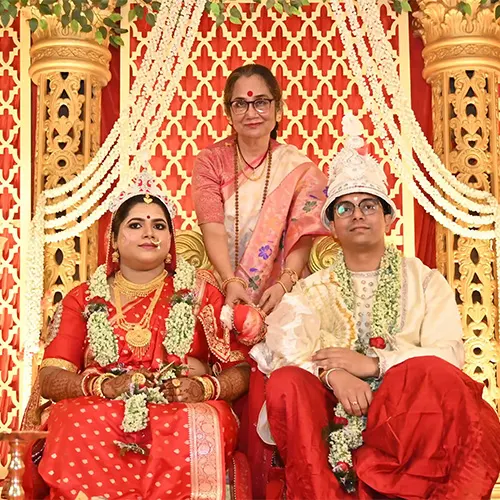
A quiet transformation is taking place in the sacred corners of Kolkata. In the land where tradition runs deep, a new wave of spiritual leadership is emerging—led not by saffron-clad men, but by women in graceful sarees, holding the sacred Vedas in one hand and compassion in the other. These are the modern priestesses of Bengal. And at the heart of this movement stands Sumangalam—a collective of lady purohits redefining how rituals are performed in today’s world.
In a society where rituals are often viewed as routine or rigid, the presence of a woman conducting them brings a refreshing change. It’s not just about replacing a male priest—it’s about offering an experience that’s rooted in understanding, grace, and emotional connection. The modern priestess is not here to challenge tradition, but to restore its original spirit—where knowledge, devotion, and dharma were never bound by gender.
For centuries, religious ceremonies have largely been conducted by male priests, especially in Hindu households. Yet if we turn to our ancient scriptures, we find strong female figures like Gargi and Maitreyi, who engaged in philosophical debates and had mastery over Vedic knowledge. There was never any scriptural rule forbidding women from performing rituals. The priestess, in that sense, is not a new idea—it is a return to what once was.
Families in Kolkata today are rediscovering this legacy. The priestess brings not just Vedic wisdom but also a gentle clarity to the ritual process. Each mantra is explained, each gesture made meaningful. Whether it’s a wedding, a naming ceremony, or a memorial service, the presence of a woman leading the ritual adds an emotional and intuitive depth that resonates with all generations.
Sumangalam is more than just a group of female priests. It is a carefully nurtured initiative born from the desire to make rituals relevant, respectful, and deeply personal. Based in Kolkata, Sumangalam’s team of trained priestesses officiates a wide range of Vedic ceremonies including Bengali weddings, annaprasan (first-rice ceremonies), housewarmings, wedding anniversaries, Seniors’ birthdays, and even rituals for departed souls.
What makes Sumangalam truly stand out is its attention to meaning. Rituals are conducted in Sanskrit but explained in Bengali, Hindi, or English, depending on the family’s preference. This ensures that every participant—not just the elders—understands the significance behind every chant and offering. Many ceremonies also integrate Rabindrasangeet and storytelling to connect the ritual to the couple’s or family’s unique journey.
Outdated practices such as kanyadaan (which translates to “donating the daughter”) are respectfully reimagined. Instead, couples are guided through rituals that emphasize equality, mutual respect, and shared intention. In this way, Sumangalam offers a sacred experience that is as meaningful as it is beautiful.
One memorable instance involved a Bengali bride and groom who wanted a wedding that reflected both heritage and modern values. They reached out to Sumangalam and worked closely with a lady priestess to craft a ceremony that included traditional Vedic chants, translations for their families, and a mutual vow exchange inspired by ancient Sanskrit verses.
The ceremony ended with the bride’s father—initially unsure about a woman conducting the wedding—approaching the priestess with tears in his eyes. “This is the first time I’ve truly felt every word of a ritual,” he said. It’s these moments that define what the modern priestess brings to the sacred space: understanding, dignity, and heart.
As more people look for meaningful ways to celebrate life’s important milestones, the demand for lady priests in Kolkata is steadily rising. Families want rituals that are not just performed, but felt. They want ceremonies that engage the young as much as they comfort the old.
Choosing a priestess from Sumangalam means:
1. Can women legally and scripturally perform Vedic rituals?
Yes. Hindu scriptures do not prohibit women from learning or performing rituals. The Vedas emphasize knowledge and devotion, not gender. Legally too, there are no barriers in India.
2. Are Sumangalam’s priestesses trained in proper rituals?
Absolutely. Each Sumangalam priestess undergoes rigorous training in Vedic scriptures, mantras, and ceremonial procedures. They approach each ritual with sincerity and expertise.
3. What types of ceremonies do they perform?
Sumangalam offers priestess-led Bengali weddings, annaprasan, housewarming pujas, Seniors’ birthdays, wedding anniversaries, and shraddha or memorial ceremonies.
4. Can I book a priestess outside of Kolkata?
Yes, Sumangalam accepts outstation requests based on availability. Prior booking is recommended for events outside Kolkata or destination weddings.
5. How do I get in touch with Sumangalam?
You can contact Sumangalam directly via the website www.sumangalamkolkata.com, or call/email for a consultation.
The image of a woman reciting mantras with devotion, clad in a traditional saree, surrounded by the soft fragrance of incense and the rhythm of a conch—this is the new face of sacred rituals in Bengal. And yet, it feels deeply familiar.
The modern priestess in Kolkata is not just performing rituals—she is healing the disconnect between tradition and relevance. Through her, ceremonies become more than obligations; they become opportunities for understanding, connection, and renewal.
Sumangalam’s priestesses offer a voice that is gentle, wise, and deeply rooted in dharma. As more families choose to walk this path, a new sacred culture is quietly blossoming in the heart of Bengal—led with compassion, knowledge, and grace.
If you’re looking to make your special day truly meaningful, we invite you to experience the power of a ceremony led by a Sumangalam priestess. Whether it’s a wedding, puja, or remembrance ritual, our team is here to make it personal and profound.
© 2025 Sumangalam . All Rights Reserved | Design & Developed by DITS